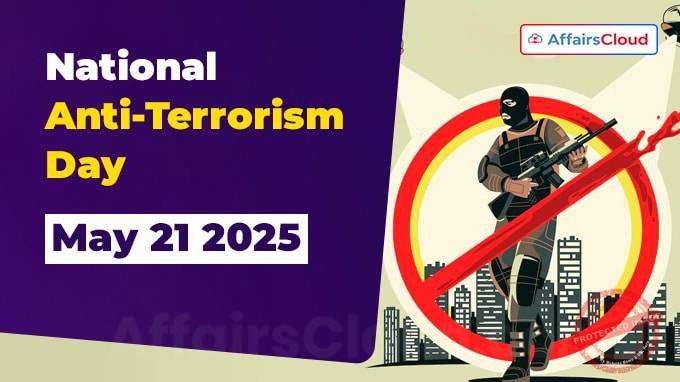 National Anti-Terrorism Day is annually observed across India on 21 May to mark the death anniversary of former Prime Minister (PM) Rajiv Gandhi, who was assassinated in 1991 by a suicide bomber associated with the Liberation Tigers of Tamil Eelam (LTTE) in Sriperumbudur, a village near Chennai, Tamil Nadu (TN).
National Anti-Terrorism Day is annually observed across India on 21 May to mark the death anniversary of former Prime Minister (PM) Rajiv Gandhi, who was assassinated in 1991 by a suicide bomber associated with the Liberation Tigers of Tamil Eelam (LTTE) in Sriperumbudur, a village near Chennai, Tamil Nadu (TN).
- The day aims to raise awareness among people about the impact of terrorism on human lives and society, and to promote unity and peace across the nation.
- 21 May 2025 marks the 34th death anniversary of the 6th PM of India, Rajiv Gandhi (1984 – 1989)
Significance:
i.The day educates the youth and the wider public about the dangerous effects of terrorism.
ii.It reaffirms India’s commitment to combat terrorism in all its forms, both domestic and international.
iii.It promotes tolerance, unity, and mutual respect, which are essential to maintaining a peaceful society.
Background:
In 1992, the Government of India (GoI) established 21 May as National Anti-Terrorism Day to honour the memory of Rajiv Gandhi, with observances coordinated by the Ministry of Home Affairs (MHA).
About Rajiv Gandhi:
i.Rajiv Gandhi was born on 20 August 1944 in Bombay (now Mumbai, Maharashtra).
ii.He became the youngest Indian Prime Minister (PM) at age 40 in 1984, assuming office after the assassination of his mother, Prime Minister Indira Gandhi.
iii.Rajiv Gandhi, widely recognized as the ‘Father of India’s Information Technology (IT) and Telecom Revolution,’ played a key role in modernizing the country’s telecommunications infrastructure, which laid the foundation for the booming IT and software industry.
- During his tenure, the Centre for Development of Telematics (C-DOT) was established in August 1984 to advance cutting-edge telecom technology tailored to India’s needs.
iv.In 1991, GoI awarded him the Bharat Ratna for his contribution to India’s development.
Legal Framework Against Terrorism:
i.Unlawful Activities (Prevention) Act, 1967 (UAPA): Empowers agencies to designate individuals/organizations as terrorists.
ii.National Investigation Agency (NIA) Act, 2008: Establishes the NIA for cross-state terror investigations.
iii.Prevention of Money Laundering Act, 2002 (PMLA): Targets terror financing networks.
Note: On 7th May 2025, Operation Sindoor, a military strike, targeted terrorist infrastructure in Pakistan and Pakistan-occupied Kashmir (PoK) following the Pahalgam attack (in Jammu and Kashmir, J&K) on 22nd April 2025, which killed 26 civilians.
Global Terrorism Index (GTI) 2025:
i.GTI 2025 was released by the Institute for Economics and Peace (IEP), a Sydney (Australia)-based think tank. The report ranks 163 countries on the basis of the impact of terrorism, using various indicators such as the number of attacks, fatalities, injuries, and property damage. India has been placed at the 14th rank with a score of 6.41, indicating a moderate but persistent impact of terrorism.
- Burkina Faso (a country in West Africa) has been ranked 1st with a score of 8.581, emerging as the most impacted country by terrorism in 2025.
- Pakistan ranked 2nd for the first time, recording over 1,000 terrorist attacks in a single year, with a 45% increase in terror incidents compared to the previous year.
- The Islamic State (IS) has been labelled as the world’s deadliest terrorist group in 2025.
Top 5 Most Affected Countries in GTI 2025 report:
| Rank | Country | Score |
|---|---|---|
| 1 | Burkina Faso | 8.581 |
| 2 | Pakistan | 8.374 |
| 3 | Syria | 8.006 |
| 4 | Mali | 7.907 |
| 5 | Niger | 7.776 |
| 14 | India | 6.41 |




